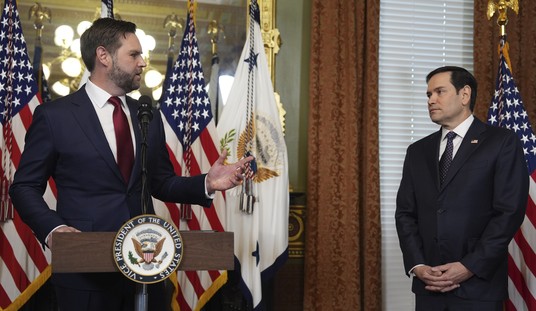Skip ahead to 4:30 of the clip. Between the racial politics involved, his duty as chairman to defend a Republican nominee, and bipartisan consensus that the Civil Rights Act was not only necessary but long overdue, he’s got a fine line to walk here. And it shows: When Tapper pressed him about this on ABC, he conceded that Paul’s position on discrimination by private businesses made him “uncomfortable” but refused to denounce it on grounds that, er, “I can’t condemn a person’s view.” (You can watch here.) In fairness, there’s really no smooth “spin” to be had in this case, which explains why Karl Rove reportedly encouraged Paul to back out of his “Meet the Press” appearance. Steele tried gamely in Tapper’s segment to steer the conversation onto safer ground, but couldn’t quite get there; Palin, when asked about Paul on “Fox News Sunday,” resorted predictably to complaining about media bias. The problem is that, even if you take the J.E. Dyer approach and emphasize that Paul’s not a racist, just a guy who worries about federal overreach, you run into this point from Sam Tanenhaus:
However attractive it may be just now to depict all political conflict as a neatly bifurcated either/or, with the heroic individual pitted against the faceless federal Leviathan, the truth is that legislative battles over civil rights laws were waged within government, and between competing incarnations of it, federal vs. state. Passage of the Civil Rights Act, as Senator Lindsey Graham of South Carolina observed last week, hinged on the Interstate Commerce Clause, which “was properly used by the courts and the Congress.”
The fact that the feds have since overreached doesn’t mean the feds should have no reach at all, and to argue that way at a moment when the GOP’s attacking ObamaCare as an abuse of the Commerce Clause is as dangerous as it is unnecessary. If the conservative take is that Congress took a mile in passing the individual mandate only because we gave them an inch by, um, letting them desegregate lunch counters, you’ve just raised the moral stakes on O-Care considerably for a whole lot of undecideds and not in a way that favors our side. The smart, and I think legally correct, way to defend the CRA while opposing the mandate is to follow Randy Barnett and Ace by arguing that the Thirteenth Amendment, not the Commerce Clause, gives Congress power to reach private actors in matters of racial discrimination. With race, as with religion, the normal constitutional rules don’t apply, and it’s the Constitution itself that says so. Read Ace, especially, for an elaboration on that point. It’s okay for the feds to operate a business (ask any GM shareholder) but it’s not okay for them to operate a church. The Establishment Clause makes a special exception because of the historical risk of religious persecution. It’s not okay for the feds to tell people whom they should associate with but it’s okay to tell business owners that they can’t racially discriminate. The Thirteenth Amendment makes a special exception because of the historical reality of America’s racial caste system. What’s ironic about Paul’s position is that in his own way he’s made the leftist mistake of reading the Constitution that he wished existed instead of the one that does. It’s a libertarian document, but it’s not perfectly libertarian. And a good thing, too.









Join the conversation as a VIP Member